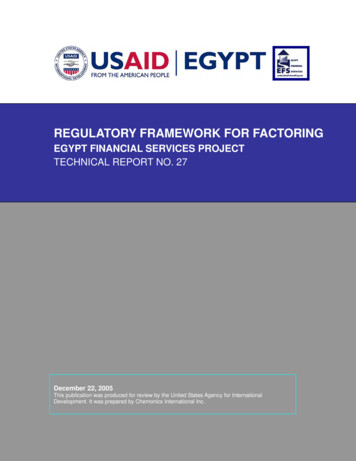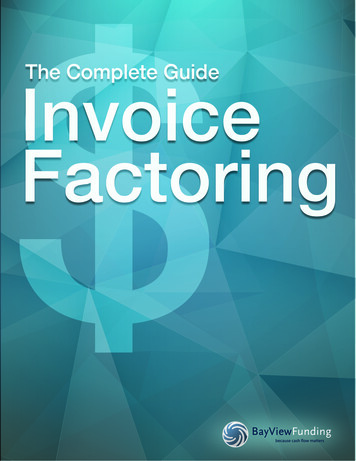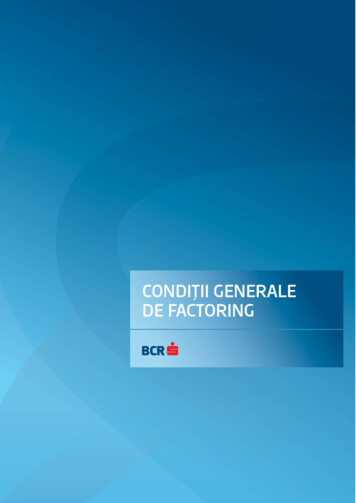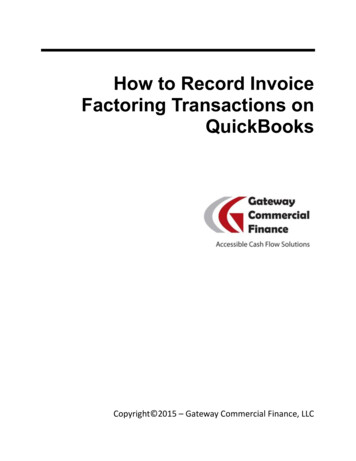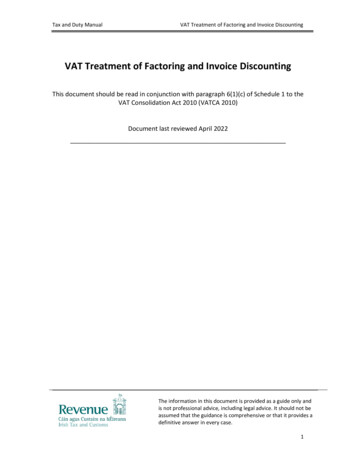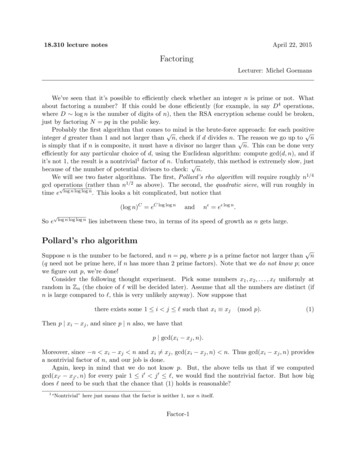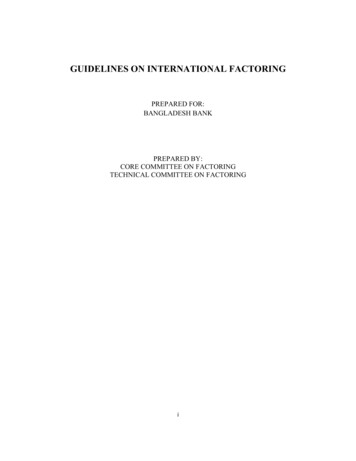
Transcription
GUIDELINES ON INTERNATIONAL FACTORINGPREPARED FOR:BANGLADESH BANKPREPARED BY:CORE COMMITTEE ON FACTORINGTECHNICAL COMMITTEE ON FACTORINGi
GUIDELINES ON INTERNATIONAL FACTORINGTechnical Committee on FactoringDr. Prashanta Kumar BanerjeeProfessor and Director (RD&C), Bangladesh Institute of Bank Management (BIBM)A. K. M. Mahmudul Hasan KhanTrade Consultant, Ministry of CommerceMd. Zakir Hossain ChowdhuryDeputy General Manager, Foreign Exchange Policy Department, Bangladesh BankAtaur RahmanSecretary General, International Chamber of Commerce (ICC) BangladeshMd. Golam Sarwar MilanBangladesh Garment Manufacturers and Exporters Association (BGMEA)Mansoor AhmedBangladesh Knitwear Manufacturers & Exporters Association (BKMEA)Ahmed ShaheenDeputy Managing Director, Prime Bank Ltd.Md. Ruhul AminAssistant Professor, Bangladesh Institute of Bank Management (BIBM)ii
ContentsSl. No.ParticularsPage Number1.Member of Technical onal Factoring35.International Factoring: Procedures46.Benefits of International Factoring in Boosting Exports and Imports87.Organization and Sources of Finance98.Membership of Factors Chain International (FCI) InternationalFactors Groups (IFG)109.Rules for Governing International Factoring1110.Documentation: Invoice Processing, Schedule of Debt and Others1311.Assignment of the Export Invoice1312.Pricing1413.Legal Issues1614.Risk Involved With International Factoring and Procedures toMinimize Risk1815.Dispute, Fraud , Procedures for Handling and Arbitration2116.Annexure25iii
1. IntroductionMost source documents available today indicate that the percentage of open account transactionin international trade payment is usually around 80 per cent of world trade. The surveyconducted by ICC clearly observes that market momentum shifts towards open account termsand importers of North America, Europe and Asia clearly move from Letter of Credits (L/Cs) toopen account settlement. Open account trade has also been experiencing accelerated growth inAsia in the recent years because exporters are facing insistence by importers that trade beconducted on open account terms.Bangladesh is not an exception. Importers and exporters in Bangladesh like other countries arealso growingly using documentary collection and open account trade payment system forinternational trade payment and finance. Both banks and corporate houses face challenges incase of documentary collection and open account trade. Open account trade means that paymentis received many weeks or even months after delivery. Unsurprisingly, exporters find that openaccount terms may create cash flow and default risk problem.On the other hand, banks face certain challenges in financing open account transactions. Banksusually take assignment/ownership of the receivable as the basis for funding. However, lawsspecific to this assignment are not available in all jurisdictions and this can cause differingopinions as to what constitutes a true sale of a receivable. Such mismatched expectations couldpotentially lead to expensive settlement methods for banks. Moreover, some jurisdictions insistthat all counterparties be informed of the assignment before it is valid, adding additional work tothe financing proposition. Additionally banks face troubles to collect money from the importersas documents do not go through banks rather documents go to the importer directly.International factoring provides a simple solution of problems faced in case of open accounttrade regardless of whether the exporter is a small organization or a major corporation. The roleof the factor/bank is to collect money owed from abroad by approaching importers in their owncountry, in their own language and in the locally accepted manner. A factor can also provide1
exporters with 100% protection against the importer's inability to pay. As international factoringlets exporters safely offer of competitive credit terms to their foreign customers, thisinternational financing mechanism is now popular among both exporters and importers. It is nowa global industry with a vast turnover and is universally accepted as vital to the financial needs ofall types of business.International factoring has become well established in developingcountries as well as in those that are highly industrialized. The total amount of internationalfactoring transacted by members of FCI in nearly 75 countries stood at Euros 352.44 billion in2013 whereas the amount of total factoring accounted for Euros 2.1 trillion at the same time.Several training programs and research works were conducted by BIBM for capacity building ofbankers to launch this international financial service. Recently, International Chamber ofCommerce (ICC) Bangladesh, Bangladesh Institute of Bank Management (BIBM), Factors ChainInternational (FCI), and Asian Development Bank (ADB) have jointly organized one seminarand workshop on International Factoring. These initiatives prompted regulator and policymakers to take actions for launching this financial service1. In this perspective, Bangladesh Bankhas formed a core committee and a technical committee to check the nitty-gritty of this service.This document is the idea of these committees. It has been prepared with a view to providingpolicy as well as a framework of operation of international factoring for practitioners as well asfor the users of international factoringInternational factoring is much more complex than domestic factoring, as the banks/financialinstitutions in different countries need to deal with cross border trade transactions. As a result, abank/ financial institution wanting/desiring to engage in international factoring needs to be amember of the factoring network2 and follow procedures, rules and regulations stipulated by1In Export Policy 2015-2018, International Factoring Services have been encouraged in financing international trade.Factors Chain International (FCI) and International Factors Group (IFG) have become a single organization since January 01,2016 with over 400 members in 2016.22
such a network. Therefore, engaging in international factoring without adequate knowledgecould cause serious problems for banks/ financial institutions.This document will serve as a useful reference and resource document for a bank/financialinstitution who wishes to start international factoring. However, once a bank/financialinstitution becomes a member of a factoring network that particular network will have its ownguidelines and manuals which the factor needs to adopt.These guidelines should not be considered as a rigid set of rules. Instead, banks/ financialinstitutions interested in offering factoring should make their own judgments that are best suitedfor the commercial environment they work. These guidelines may work as a possible checklistand a source of reference.2. International FactoringInternational factoring started in the 1960s. European countries were the pioneers in introducinginternational factoring. International Factoring is a simple extension of the domestic factoring.International factoring means the seller and buyer are in different countries. Over the years,international factoring has taken various forms due to varying needs of the exporters and securityto the factors besides price bearing capacity of the former. These are: (A) Two Factor System(B) Direct Export Factoring (C) Direct Import Factoring (D) Back to Back Factoring (Details inAnnex-I).The diplomatic conference of International Institutefor Unification of Private Laws(UNIDROIT) , held at Ottawa, Canada in 1988, defined international factoring as an agreementbetween an exporter and a factor whereby the factor having purchased the trade debts from theexporter, would provide the services such as finance, maintenance of sales ledger , collection ofdebts, protection against credit risk, etc.3
Services offered in international factoring include investigating the creditworthiness of buyers,assuming credit risk and giving 100% protection against write-offs, collection and managementof receivables and provision of finance through immediate cash advances against outstandingreceivables.The most common method of conducting international factoring transactions is through the“Two Factor system” which means the participation of two factors in the transaction, one in theImporter s Country and the other in the Exporter’s country.Altogether, there are four parties involved in an international factoring transaction. These are: The Exporter The Importer The Export Factor, (EF) the factor located in the exporter’s country The Import Factor, (IF) the factor located in the importer’s countryThe two factors need to be members of an international association or a network of factors whichis usually termed as a “Chain” (FCI IFG). The two factors as members are required to abide bythe rules and regulation of the Association.3. International Factoring: ProceduresAmong the stated factoring systems, two factoring system is widely used in international trade.The procedure followed in case of Two Factor system is shown in details below in two-stage e.g.Process before Shipment and Process after Shipment. Procedures of other systems ofinternational factoring (Direct Export Factoring, Direct Import Factoring and Back toBack Factoring) detailing all steps are placed in Annex –I.3.1. Process Before Shipment4
3.1.1. The Importer and the Exporter enter into an agreement whereby the Importer agrees toimport and purchase goods from an Exporter as per certain specifications, quality, and price andcredit terms. Based on these, the Exporter could estimate the maximum exposure or amount ofcredit that needed to be granted to the Importer at any given time. E.g. if the Importer has placedorders of US 10,000 worth of goods each with a credit period of 4 months to be shipped everymonth then the required credit limit will be US 40,000.3.1.2. The Exporter then forwards details to the EF and requests for a credit line for that amount.In this example the credit line requested will be US 40,000.3.1.3. The EF briefly examines the past records of the exporter, his reputation and his ability tosupply that amount and requests for a credit cover from an Import Factor (IF) for the specifiedamount. Generally, at this stage the IF would request the EF to sign an inter-factor agreement(Annex-II).3.1.4. IF then carries out an appraisal of the importer/ debtor.3.1.5. If the importer is creditworthy for the amount the EF has requested, IF approves the creditlimit. On the contrary, if the importer is not creditworthy for the amount requested by theexporter then the IF may grant a lower amount or reject credit for the Importer. Along with thecredit approval, the IF will also give his charges.3.1.6. EF then informs the client/exporter in writing that the credit limit has been approved/rejected / or whether a lower credit limit has been given. At this stage, EF specifies anyconditions that he wants to include in the agreement and also quotes his charges which willinclude IF’s charges as well. Based on the credit cover given by the IF and the charges quoted bythe EF, the exporter may decide to re- negotiate the terms with buyers.3.1.7. If the Exporter agrees to the terms with EF, the Exporter enters into a formal exportfactoring agreement with the EF to use his services.3.1.8. EF informs the IF that the Exporter has signed the export factoring agreement.5
3.1.9. At this stage IF will also send the assignment clause that is needed to be affixed to eachinvoice prepared. EF then notifies the importer and the exporter that the invoices should beassigned in favor of the IF and the importer should make the payment to the IF and not to theexporter.Process Before Shipment3.2. Process After Shipment3.2.1. The Exporter ships the goods and sends the shipping documents to the importer withthe assignment clause (given by the IF) printed / affixed to the invoice.3.2.2. The Exporter then submits the copies of invoices, shipping documents, packing list,etc. to EF. Alternatively, exporter could send the original shipping documents to the EF6
and EF could then post the documents to the Importer with the assignment clauseproperly affixed.3.2.3. On submission of proof of shipment and assignment of invoices, the EF advancesfunds to the exporter on the agreed terms. EF also notifies the IF of the shipment.3.2.4. At this stage, EF follows up with IF and accordingly IF follows up the importer. If theImporter fails to pay within about 7 days after the due date IF will contact the importerand remind him of the payment. Thereafter, IF adopts a standard procedure on followingup and collecting the proceeds from the importer3.2.5. Once the IF collects the debt he is required to remit the money immediately to the EF.If there are delays in remitting the money, according to the standard practices of thefactoring chains, the IF will become liable to pay penalty interest to the EF.3.2.6. After receiving the proceeds EF will pay the exporter the balance due less the discountcharge, the total service charge and any other charges mentioned in the agreement.3.2.7. The EF will also remit the IF’s charges which should be in the foreign currency.Process After ShipmentIMPORTERPayment of Charges to IF (7)EXPORTFACTOR(EF)Balance payment (6)Sends Payments (5)7Follows up with IF (4)Advance payment (3)(3) Notifies the IF of the shipmentEXPORTERCopies of invoices (2)Collections (5)Follow up (4)IMPORTFACTOR (IF)Export goods and assign documents (1)
4. Benefits of International Factoring in Boosting Exports and Imports4.1. Factoring is actually designed to ease the traditional problems of exporting on non L/Csmechanisms particularly open account. In summarized version, benefits of exporters andimporters under international factoring are placed below.Table 1: Benefits for Exporters and ImportersBenefits for ExportersIncreases sales in foreign markets by offeringcompetitive terms of sale.Protection against credit losses on foreigncustomers.Accelerated cash flows through fastercollections.Lower costs than the aggregate charges for L/C transitions.Liquidity to boost working capital.Enhanced borrowing potential and anopportunity to make use of suppliers’discounts.Benefits for ImportersPurchase on convenient ‘open terms’ terms.No need to open L/Cs.Expansion of purchasing power withoutblocking existing line of credits.Orders can be placed swiftly without incurringdelays , L/C opening charges, negotiationcharges , etc.Source: Factors Chain International (FCI) International Factors Group (IFG).4.2. As mentioned earlier, importers are no more interested to import under L/C. Exporters faceincreasing insistence by importers that trade be conducted on open accounts terms in place ofL/Cs. Importers have to provide required margin and sufficient security to their banks in order to8
confirm L/Cs. Even for a successful importer, there comes a time when the growingrequirements for L/Cs margin go beyond the importer's financing ability and L/Cs coverageexceeds the security available to give to the bank. Moreover, importers need to approach banksfor issuing L/Cs on each occasion of importing goods from abroad, which is really timeconsuming. Under international factoring, an importer gets rid of these hassles of L/Cs becausethis financial product facilitates exporters to export under open accounts terms in place of L/Csthrough solving the problems of cash flow and default risk associated. It also provides importerswith opportunity for payment to exporters after selling imported products.4.3. In open account terms, exporters receive payment many weeks and months after delivery,which can cause acute cash problems. Further problems can arise if the importers delay paymentand make no payment at all because of financial failure. International factoring provides a simplesolution under two-factor system regardless of whether exporter is a small or large organization.The exporter gets finance immediate after submitting the relevant documents to the export factorand the import factor collects money at the end of the approved period from the importers of thesame country and in the locally accepted manner. The factor also provides with 100 per centprotection to the exporter against the importer's inability to pay. As a result, exporters canincrease export by offering competitive credit terms of sales. Cost in 'international factoring' islower than the aggregate charges for L/C transactions. International trade under L/C involvesdifferent parties namely issuing bank, confirming bank, negotiating bank, collecting bank,presenting bank, which increases aggregate charge for L/C. But ‘international factoring’ incursless cost as it has only two parties, import factor and export factor.5. Organization and Sources of FinanceA major area for decision for offering factoring is to determine what types of organization canperform factoring activities. Some countries have no regulations or requirements of any kind onwho may be factor. Countries without the involvement of banks/ financial institutions and withno capital requirements (such as Brazil) have seen a proliferation of thinly-capitalized andmarginal entities offering factoring, which is undesirable.9
In Bangladesh, it is expected that only banks and financial institutions can offer internationalfactoring services. Three types of organizations namely (I) independent financial institutionsoffering factoring services jointly backed by a number of banks, financial institutions andinsurance companies, (II) a subsidiary organization of a bank or financial institution, and (III) adivision of a bank and financial institution can offer this financial service.At the initial stage in Bangladesh, a few independent financial institutions jointly backed by anumber of banks, financial institutions and insurance companies’ seem more suitable because oflimited scope of doing business as well as paucity of expert manpower on factoring at this stage.If it is so, participating financial institutions will provide seed capital for the organization. Lateron, institutions can generate funds by issuing different money market instruments likecommercial paper, certificate of deposits, etc. On the other hand, parent banks or financialinstitutions can provide the startup capital if it is started as a subsidiary or a division.However, following standards can be set in creating organization for offering factoring:1. The bank/ financial institution is to be a joint stock company. This would appear to be aprudent requirement to ensure proper governance, financial management and reporting.2. Minimum capital for factoring should be fixed at or near the level required forparticipation in Factors Chain International (USD 2 million) International FactorsGroup.6. Membership of Factors Chain International (FCI) International Factors Group (IFG)Bank or the financial institution needs to become a member of the international network ofFactors commonly known as “Factoring Chains” in order to engage in international factoring.There were two such international chains namely the Factors Chain International (FCI) and theInternational Factors Group (IFG)3, which have become one organization (FCI IFG) sinceJanuary 1, 2016.3FCI and IFG have already been merged and now become one factoring chain worldwide.10
Once a bank becomes a member of FCI IFG, the member has to agree to abide by theconstitution of the Network and its rules and regulations. FCI IFG usually considers thefollowing in granting membership to a financial institution or a bank.Financial institutions or banks or departments of such institutions applied for membership of FCIshould be well-reputed. The bank or financial institution should have a minimum net worth ofUS 2.0 million. However, even if the prospective member is unable to meet this net worthrequirement, FCI could still consider the application provided that such a member is backed by afinancial institution or bank of good financial standing and it is willing to give a commitment toFCI on behalf of the Institution applying for membership.Initially a member is admitted as an “Associate Member”. The membership fee usually amountsto about US 7,000. The full membership is granted only if the Seller is generating an annualinternational factoring volume of at least US 20.0 million and is engaged in both aspects ofinternational factoring import and export.7. Rules for Governing International FactoringInternational factoring using the two-factor system requires a set of rules and procedures whichgovern the activities and basis for cooperation between two factors conducting the transaction intwo jurisdictions. By joining FCI, a factor signs “Inter-factor Agreement (Annex –II)” in whichit commits to be governed by following sets of rules and procedures.1. The General Rules for International Factoring (GRIF) (Annex-III)2. The edifactoring.com Rules (Annex-IV)3. The Rules of Arbitration (Annex-V)4. Specific Issues Relating to Regulation of Factoring11
The General Rules for International Factoring (GRIF): The GRIF is a uniform set of rules andregulations issued by FCI consisting of VIII sections and 32 articles. It governs transactionsbetween FCI members. The GRIF is a comprehensive set of rules, which covers the followingareas:Factoring Contracts and Receivables, Parties Taking Part in Two-Factor International Factoring,Receivables Included, Common Language, Time Limits, “Writing”, Deviating Agreements,Numbering System, Commission/Remuneration, Settlement of Disagreements between ExportFactor And Import Factor, Good Faith and Mutual Assistance, Assignment, Validity ofAssignment, Validity of Receivables, Reassignment of Receivable, Definition of Credit Risk,Approvals and Requests for Approvals, Reduction or Cancellation, Obligation of Export Factorto Assign, Rights of The Import Factor, Collection, Unapproved Receivables, Transfer ofPayments, Payment under Guarantee, Prohibitions Against Assignments, Late Payments,Disputes, Representations and Warranties, Communication and Electronic Data Interchange(EDI), Accounts and Reports, Indemnification ,Breaches of Provisions Of These Rules.The edifactoring.com Rules: The edifactoring.com Rules govern how members communicatewith each other, the obligations of the respective factors, and matters of security, confidentialityand storage of records. Transactions between the respective factors are validly concluded by theexchange of edifactoring.com messages without any written documentation.The Rules of Arbitration: The FCI Rules of Arbitration provide for a method of resolvingdisputes between FCI members through an FCI arbitration process, which involves appointingarbitrators whose decisions are binding. It consists of 18 articles and includes FCI Arbitration,Choice of Arbitrators, Request for Arbitration, Answer to the Request, Transmission File to theArbitrator, Rules Governing the Proceedings, Place of Arbitration, Terms of Reference, TheArbitration Proceedings, Award by Consent, Time Limit for Awards, Decisions to Cost ofArbitration, Making of Award, Notification of Award to Parties, Settlement of Arbitration Costs,Distribution of Award, Language of Arbitration, General Rules.12
Specific Issues Relating to Regulation of Factoring: If any country has specific legal andregulatory settings particularly for contracts between parties and assignment of receivablesamong others, factors need to follow these rules too.8. Documentation: Invoice Processing, Schedule of Debt and OthersIn factoring, invoice is the only document that gives right to the debt. Accuracy of the invoice is,therefore, utmost important. Additionally, Schedule of Debt is also an important document.Exporters formally offer the debt stated in the Invoice for factoring by sending Debt Schedule(Annex-VI).Documents should include the following:I. A covering letter to the Importer indicating that all documents are in order.II. Invoices – with the required number of copies and signed and prepared as specified bythe importer.III. Notification (Format is provided by the IF).IV. Bill of lading and the necessary copies.V. Packing list – As specified by the importer.VI. Insurance Documents, Certificates of Origin, Quality certificates and other documentsrequired by the Importer or the authorities of the importers and exporters country.VII. Schedule of Debts. (A sample Schedule of Debts is given in Annex-VI).9. Assignment of the Export Invoice13
Exporter needs to assign the invoice to the IF very carefully. The Exporter affixes the assignmentclause on the invoice. Through this assignment, exporter notifies the importer about the exportfactoring transaction.The assignment of the invoice gives the right to the IF to recover the money from the importer,which in turn enables IF to provide the guarantee to the EF on behalf of the importer. Thisguarantee is what enables EF to advance funds to the exporter at the post shipment stage. As theinvoice originates from the exporter’s country, the EF has to ensure that the invoice is properlyassigned to the importer.The Assignment clause will vary according to different countries’ legal requirements. Exampleof an assignment clause is placed n below.“The debt shown in this invoice has been assigned to ABC Factors (Name of IF)who alone is entitled to receive payment. The payment must be in the invoicecurrency and made by bank transfer to XYZ Bank (Address of Bank) tothe credit no 123456 (Name of IF’s Bank, address and account number) quotingyour exporter’s name. If you have any claims or queries about this invoice or ageneral enquiry please telephone xxxxx (Tel no of XYZ Bank , i.e. IF’s bank)”10. PricingIn a factoring transaction there are two cost components, Service Charge and the Discount Charge.Service charges include the IF’s and the EF’s charges and are generally computed as a percentage ofinvoice value. The Exporter needs to bear these charges. In quoting prices for the importer, theexporter could always incorporate these factoring charges into his selling prices.The EF gives his charges at the time of approving the credit line. The total service charge andthe discount charge should be separately quoted by the EF to the exporter and should be included14
in the export factoring agreement which the EF signs with the exporter. However, it is notobligatory for the EF to give the exporter the respective services charges of IF and EF separately.A detailed description as well as the basis of computation of these charges is given in the followingTable.SL.NO.ParticularsComponents of costsRangeTypically range from 0.8% to1.2% of the invoice value.4*Credit appraisal costA.ServiceChargeI. IF’sCharges*Administration costs*Follow up costs*Premium to cover the credit riskII. EF’sCharges*Administration cost: Cost of EF’s service charge generallyinitiatingthedocumentation,transaction, is around 0.5 % of the invoicesappraisalsand valuefollow up.* Amount for risk of recoursingthe debt in case of dispute5.4These charges will depend on the volumes that the exporter is expected to generate. Some of the above costs are offixed nature. Therefore, a high trading volume with a regular turnover will make IF’s functions very cost effective.Further, if the debtor is strong the risk premium could be low. In such a scenario, the service charge could be on thelower threshold. On the other hand, the percentage charge could be high if the turnover is inconsistent, if the exportvolumes are of small values and if the buyer carries a high credit risk.5When EF advances a percentage of the invoice value to the exporter, the EF expects to recover this amount fromthe importer or from the IF’s guarantee. However, if the importer refuses to pay the debt due to a dispute then the EFis exposed to a credit risk. Although in this event the EF has the right of recourse to the Seller this credit risk has tobe factored into these charges. Usually, only a part of this risk is covered in the service charge while the major partof this risk is covered in the discount charge.15
B.DiscountChargesThis is charged by the EF as a Discount charge Cost ofpercentageontheamount fund Client’s credit risk advanced to the exporter. This is Expected margin6similartotheinterestratescharged by EF as a financialinstitution.C.TotalCharges(A B) Service chargeTotal service charge : Discount charges (Like B) Thecompositeservicecharge – which usually worksout to be around 1.5 % of theinvoice values. Minimum Service charge –A monthly fee including bothIF’s and EF’s charge.7 Document handling charge– usually per invoice811. Legal Issues in the Context of BangladeshIn case of local rules and regulations, some countries do not have any comprehensive legalframework for operation of international factoring and it is being operated under country’sexisting legal and fiscal framework. However, some countries have specific legal framework for6This is usually calculated daily on the end of day balance and the cumulative charge is debited to the client accountat the end of the month.7IF may levy Minimum Service charge. It is not unusual for the IF to have a minimum charge in order todiscourage the exporter for not providing regular orders. This could be monthly charge or an annual charge. It has tobe noted that even if the Exporter does not transact the minimum volumes as agreed, the EF will become liable topay the minimum service fee to the IF. In this case, the EF should ensure that such charges are transferred to theexporter. These charges should be included in the agreement. It is also not uncommon for EF to charge a minimumservice charge to ensure that the exporters adhered to their sales commitments.8 The IF may impose a Document Handling Charge to discourage small orders or make them cost effective for theIF.16
operating international factoring. If Bangladesh follows
factoring transacted by members of FCI in nearly 75 countries stood at Euros 352.44 billion in 2013 whereas the amount of total factoring accounted for Euros 2.1 trillion at the same time. . factoring agreement with the EF to use his services. 3.1.8. EF informs the IF that the Exporter has signed the export factoring agreement.



